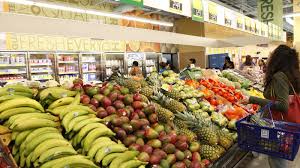The International Food Policy Research Institute (IFPRI) has launched the 2022 Global Food Policy Report in an effort to mitigate the effect of climate change and increase its adaption in Nigeria.
Mr Clemens Breisinger, a Senior Official, IFPRI, in Abuja during the launch said this was aimed at addressing the multiple challenges and crisis faced such as fertiliser prices, drought and climate change by farmers.
He said the launch of the report shows that the challenges that comes with climate change in different parts of the world also has potential solutions.
“The Launch of IFPRI’s Global Food Policy report is to address the challenges that comes with climate change but also with some of the potential solutions.
“At the same time, we have heard about what the high food and fertiliser mean for Nigeria, and again there is urgent need for action.
“It is important to note that climate change and the global emission was caused by industrialised countries and all the countries in Africa including Nigeria have to bear the brunt of the consequences”, he said.
He said the policy if implemented would change the growing threat to the country’s food systems, livelihood and overall well-being of its citizens.
Breisinger called for better collaboration between Nigeria and the international community to implement the action on ground for food and nutrition security.
Participants in a group photograph at the launch of the 2022 Global Food Policy Report By IFPRI in Abuja
Mr Kwaw Andam, Country Programme Leader /Senior Research Fellow, IFPRI Nigeria, said that IFPRI has been supporting the Nigeria government through implementing its Strategy Support Programme since 2007.
Andam who joined virtually said the Impact of global warming was becoming increasingly evident and needed to be address fast.
“Higher temperature, sea level rise, growing frequency and intensity of extreme weather such as drought, floods, extreme heat are already reducing agricultural productivity and disrupting food supply chains.
“Beyond its direct impacts on production, climate change will create cascading effects on livelihoods, communities and sustainability through interconnections among economic.
“Action to address climate change has begun but it urgently needs to be accelerated by hastening innovation, reforming polices , ” he said.
According to him, IFPRI has been implementing Nigeria Strategy Support Program since 2007 and with the support of the USAID.
He added that its currently implementing the Nigeria Agriculture Policy Activity in partnership with Michigan State University.
“We are also working closely with the Federal Ministry of Agriculture and Rural Development, State Ministries and other partners to support the implementation of development plans, ” he said.
Ms Charlotte Hebebrand, Director of Communications and Public Affairs, IFPRI, said IFPRI has tried to understood the global picture, adding that, climate change could be mitigated and adapted to at the national level.
She said efforts were being made to educate the local farmers on the effects of climate change, how to mitigate it or to adapt.
She further noted that farmers needed to adopt the necessary technologies in order to get a very good yield while adapting to climate change.
“Farmers are at the forefront of climate change, their productivity is normally impacted by climate change.
“So, they urgently need understanding, information about agricultural practices that can help them adapt to climate change, they also need to get information about new technology.
“This can help them adapt as well as mitigate climate change, because as we also presented today that there are also greenhouse gas emissions coming from agricultural practices.
“So both are going to be very important, but farmers are central to this, farmers need access”, she said.
On his part, the Minister of Agriculture and Rural Development, Dr Muhammed Abubakar said that the ministry would not relent in its effort to support development programmes to better the lives of farmers.
The Minister was represented by Mr Ularamu Ubandoma, the National
Coordinator, Rural Access and Agricultural Marketing Project (RAAMP).
Abubakar added that the ministry has lots of programmes towards ensuring food security and self sufficiency of food production in the country.
He added that most of these projects were being sponsored by development partners and the Nigeria government as well.
He assured the public that the ministry would leverage on this Policy that was launched to make sure that “food security is ensured in this country.”
The 2022 Global Food Policy Report sets out a broad range of opportunities for accelerating action that should be considered in Policy and investment decision making for climate change adaption, mitigation and resilience.




